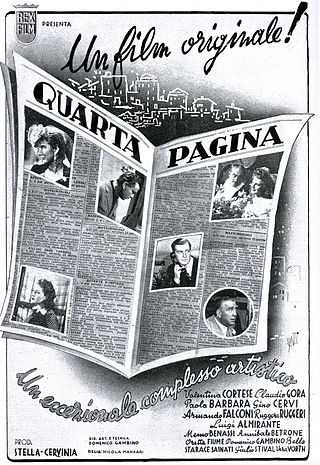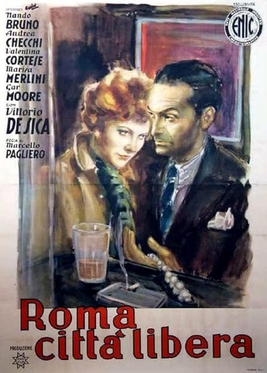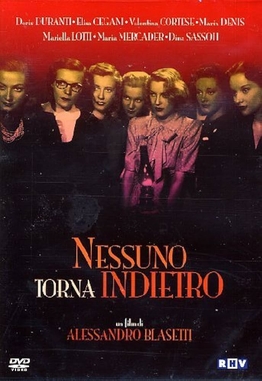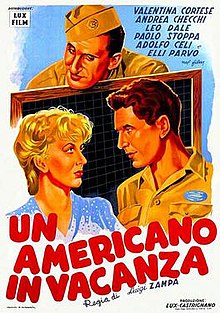
Valentina Cortese, sometimes credited as Valentina Cortesa, was an Italian film and theatre actress. In her 50 years spanning career, she appeared in films of Italian and international directors like Michelangelo Antonioni, Federico Fellini, Franco Zeffirelli, François Truffaut, Terry Gilliam, Joseph L. Mankiewicz and others.

Adolfo Celi was an Italian film actor and director. Born in Curcuraci, Messina, Sicily, Celi appeared in nearly 100 films, specialising in international villains. Although a prominent actor in Italian cinema and famed for many roles, he is best remembered internationally for his portrayal of Emilio Largo in the 1965 James Bond film Thunderball. Celi later spoofed his Thunderball role in the film OK Connery opposite Sean Connery's brother, Neil Connery.
Italy–USA Foundation is a non-profit non-partisan organization based in Rome, Italy, established to promote friendship between Italians and Americans plus American culture in Italy.

Marriage is a 1954 Italian historical comedy film directed by Antonio Petrucci and starring Vittorio De Sica, Silvana Pampanini and Alberto Sordi. It consists of three segments, based on three stage plays by Anton Chekhov.

Luigi Zampa was an Italian film director.
I Live as I Please is a 1942 Italian "white-telephones" comedy film directed by Mario Mattoli and starring Ferruccio Tagliavini, Silvana Jachino and Luigi Almirante. It was shot at the Titanus Studios in Rome. The film's sets were designed by the art directors Piero Filippone and Mario Rappini.

The Actor Who Disappeared is a 1941 Italian comedy mystery crime film directed by Luigi Zampa and starring Vivi Gioi, María Mercader and Giulio Donadio. It is a remake of the German film Was wird hier gespielt? (1940) based on the eponymous play by Theo Lingen. It was shot at the Cinecittà Studios in Rome. The film's sets were designed by the art director Giorgio Pinzauti.

A Garibaldian in the Convent is a 1942 Italian historical comedy drama romantic film directed by Vittorio De Sica and starring Leonardo Cortese, María Mercader and Carla Del Poggio. It is considered to be the work with which De Sica concludes the series of light comedies largely set in colleges and institutions for young girls and period costumes to enter into films of more contemporary and popular settings that will result in post-war neorealistic works. It was screened in November 1991 as a part of a retrospective of De Sica's films at the Museum of Modern Art. It was shot at the Palatino Studios in Rome. The film's sets were designed by the art director Veniero Colasanti.

Kidnap Syndicate is a 1975 Italian poliziottesco film directed by Fernando Di Leo. Even being a minor work in the Di Leo's filmography, the film gained some critical attention for being an original re-interpretation of the "vigilante" subgenre.

I Am Afraid is an Italian crime film directed by Damiano Damiani.
The Queen of Navarre is a 1942 Italian "white-telephones" historical film directed by Carmine Gallone and starring Elsa Merlini, Gino Cervi and Renato Cialente. It was made at the Cinecittà Studios in Rome, based on a play by Eugène Scribe. The film portrays a series of intrigues at the Madrid court of Charles V in the Sixteenth century.
First Love is a 1941 Italian drama film directed by Carmine Gallone and starring Leonardo Cortese, Vivi Gioi and Luigi Almirante. It was made at the Cinecittà Studios in Rome.

Chronicle of a Homicide is a 1972 Italian crime-drama film directed by Mauro Bolognini.

Il conte Aquila is a 1955 Italian historical drama film directed by Guido Salvini. Inspired to real life events of Italian revolutionary Count Federico Confalonieri, it is based on the drama with the same name by Rino Alessi.

The Ten Commandments is a 1945 Italian drama film directed by Giorgio Walter Chili. It features an ensemble of Italian actors in episodes based on the Ten Commandments.

Kean: Genius or Scoundrel is a 1956 Italian historical biographical film co-written, directed by and starring Vittorio Gassman. It also features Eleonora Rossi Drago, Gérard Landry and Valentina Cortese A dramatization of the life of nineteenth century actor Edmund Kean, it is based on the drama play Kean (1836) by Alexandre Dumas and its 1953 adaptation with the same name by Jean-Paul Sartre. It was Gassman's first film as director. It was screened at the Locarno Film Festival in 1957.

The Hero of Venice is a 1941 Italian historical adventure film directed by Carlo Campogalliani and starring Gustav Diessl, Paola Barbara, Rossano Brazzi and Valentina Cortese.

Fourth Page is a 1942 Italian mystery film directed by Nicola Manzari and starring Claudio Gora, Valentina Cortese and Paola Barbara. It was shot at the FERT Studios in Turin. The film's sets were designed by the art director Arrigo Equini.

Rome, Free City is a 1946 Italian drama film directed by Marcello Pagliero and starring Valentina Cortese, Andrea Checchi, Marisa Merlini and Vittorio De Sica. The film's sets were designed by the art director Gastone Medin.

No Turning Back is a 1945 Italian drama film directed by Alessandro Blasetti and starring an ensemble cast including Elisa Cegani, Valentina Cortese, Maria Denis, Doris Duranti, Mariella Lotti, María Mercader, Dina Sassoli and Vittorio De Sica. It is based on the 1938 novel of the same title by Alba De Cespedes. It was shot at the Scalera Studios in Rome. The film's sets were designed by the art directors Guido Fiorini and Carlo Egidi. Made in 1943 during the Second World, due to disruption caused by the fighting in Italy, it did not go on release until January 1945.
















